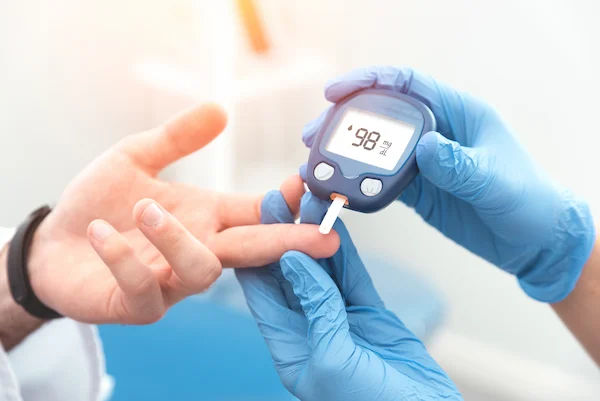Preventing Diabetes with Family History Tips
Worried about diabetes in your family? Learn how to prevent Type 2 diabetes through diet, exercise, weight control, and regular check-ups—even with a genetic risk.

Written by Dr. Vasanthasree Nair
Reviewed by Dr. Vasanthasree Nair MBBS
Last updated on 22nd Jul, 2025

Introduction
If diabetes runs in your family, you may be worried about developing it yourself. The good news is that while genetics play a role, lifestyle choices have a significant impact on whether or not you develop diabetes. By taking proactive steps, you can reduce your risk and maintain good health.
This article will guide you through understanding diabetes risk, recognizing early signs, and adopting healthy habits to prevent or delay its onset.
Understanding Diabetes and Family History
Diabetes is a chronic condition where the body either doesn’t produce enough insulin (Type 1) or becomes resistant to insulin (Type 2). Type 2 diabetes is more common and often linked to lifestyle factors and genetics.
If a parent or sibling has diabetes, your risk increases. However, having a family history doesn’t mean diabetes is inevitable. With the right precautions, you can significantly lower your chances of developing it.
Early Warning Signs to Watch For
If diabetes runs in your family, be aware of these early symptoms:
Increased thirst and frequent urination
Unexplained weight loss or gain
Fatigue and irritability
Blurred vision
Slow-healing wounds
Frequent infections
If you notice these signs, consult a doctor for blood sugar tests. Early detection helps in better management.
Lifestyle Changes to Prevent Diabetes
Let's see how we can prevent diabetes through changing lifestyle:
1. Eat a Balanced, Diabetes-Friendly Diet
Choose whole grains (brown rice, whole wheat, oats) over refined carbs (white bread, sugary snacks).
Increase fibre intake with vegetables, fruits, beans, and nuts.
Limit sugary drinks and processed foods (sodas, sweets, fast food).
Control portion sizes to avoid overeating.
Opt for lean proteins (fish, chicken, tofu) instead of fatty meats.
2. Stay Active and Exercise Regularly
Aim for at least 150 minutes of moderate exercise (walking, cycling, swimming) per week.
Include strength training (weight lifting, resistance exercises) twice a week.
Avoid long periods of sitting; take short walks every hour.
3. Maintain a Healthy Weight
Excess body fat, especially around the belly, increases diabetes risk.
Even a 5-10% weight loss can significantly lower your risk.
4. Get Regular Health Check-ups
Monitor blood sugar levels (HbA1c, fasting glucose tests).
Check blood pressure and cholesterol regularly.
If you’re at high risk, your doctor may recommend preventive medications like metformin.
5. Reduce Stress and Improve Sleep
Chronic stress raises blood sugar—practice yoga, meditation, or deep breathing.
Aim for 7-8 hours of quality sleep per night. Poor sleep affects insulin sensitivity.
Get Your Symptoms Checked By An Endocrinologist
6. Avoid Smoking and Limit Alcohol
Smoking increases insulin resistance.
Excessive alcohol can lead to weight gain and blood sugar spikes.
When to See a Doctor
If you have a family history of diabetes, consider:
Annual blood sugar tests (especially after age 35).
Consult a doctor if you notice symptoms like extreme thirst or fatigue.
Seeking guidance on personalised diet and exercise plans.
Take Charge of Your Health Today
Having a family history of diabetes doesn’t mean you’ll develop it. By making smart lifestyle choices, you can stay ahead of the risk.
If you’d like personalized advice, Apollo 24|7 offers expert consultations and diabetes screening tests. Book an appointment today to take control of your health!
Conclusion
Preventing diabetes is possible with awareness and action. Small, consistent changes in diet, exercise, and health monitoring can make a big difference. Start today—your future self will thank you!
Would you like help finding a diabetes prevention plan? Let us guide you—reach out now!
Get Your Symptoms Checked By An Endocrinologist
Get Your Symptoms Checked By An Endocrinologist

Dr. Nithin Reddy Modhugu
Endocrinologist
6 Years • MBBS, MD (General Medicine), DNB (Endocrinology)
Hyderabad
Dr. Nithin's Endocrine Clinic, Hyderabad
(100+ Patients)

Dr. Gayatri S
Endocrinologist
4 Years • Suggested Qualifictaion- MBBS, MD (Internal Medicine), DM (ENDOCRINOLOGY)
Nellore
Narayana hospital, Nellore

Dr. Shiva Madan
Endocrinologist
10 Years • MBBS , MD (General medicine) , DM (Endocrinology)
Bikaner
Sushma diabetes and Endocrine center, Bikaner

Dr. Venkata Rakesh Chintala
Endocrinologist
8 Years • MBBS,MD( GEN MEDICINE), DM ( ENDOCRINOLOGY)
Krishna district
Sanjeevani Hospital, Krishna district

Dr. Arunava Ghosh
General Physician/ Internal Medicine Specialist
9 Years • MBBS,MD(GENL.MED.),DM(ENDOCRINOLOGY)
Kolkata
VDC Clinic, Kolkata


